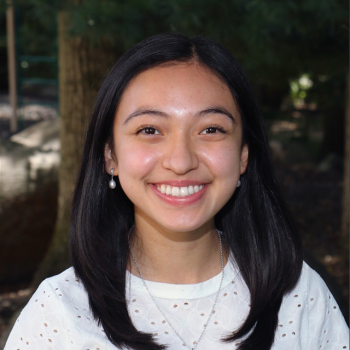Livingstone Undergraduate Research Award in Creative Works and Media Production
Livingstone Undergraduate Research Award in Creative Works and Media Production
Angela Cirelli

Two Sides to the Story: Linguistic Assimilation in America
View Angela’s project online
This non-traditional research project aims to shine light on the importance of language to identity. By bringing together previous literature to create letters and juxtaposed magazines, the project considers the arguments of both supporters and opponents of assimilation from an immigrant’s perspective. This creative exploration reveals the negative repercussions of linguistic assimilation on the individual, both psychologically and culturally.
What is your major and expected year of graduation?
I am pursuing a public health major and a Spanish minor, with an expected graduation in 2026.
What inspired you to pursue your project?
Being biracial and the daughter of an immigrant, I have always been immersed in two different cultures, and I learned the value of understanding my mother’s native tongue of Tagalog at a young age. While I did not know Tagalog as a toddler, I noticed a significantly closer connection to my roots and reclaiming of my Filipino identity once I did learn the language. These childhood experiences, along with the development of a strong appreciation for cultural diversity and a passion for language learning, led me to wonder how others are influenced by linguistic ability on a national scale. Therefore, when tasked with a final research project in my Honors Representing Race class, the topic of linguistic assimilation in America piqued my interest.
What does winning this award mean to you?
Winning this Livingstone Award for Creative Works and Media Production is such an honor. I am extremely grateful for the guidance of my faculty mentor Melissa Toomey and her thought-provoking Honors Representing Race class that made this project possible. As just a first-year undergraduate student, I am inspired to continue challenging myself to bring creativity and interdisciplinary work into my fields of interest, and I am excited to discover the next research opportunities ahead of me. I hope that this award will allow my project to reach a larger audience in order to promote more respect for and pride in immigrants’ native languages, thus leading to an eventual rise in bilingualism.
How did the Libraries support your research?
Temple Libraries’ online database connected me to several diverse, helpful sources over the course of my research process. From primary source documents and academic journal articles to research studies and even artistic works, the wide variety of mediums made it possible to craft a well-rounded argument, accurately portraying both pro-assimilation and anti-assimilation points of view. Not to mention, Charles Library was an ideal, tranquil space for productive research.
Weaving together narrative, extensive research, and a passionate argument positing the powerful consequences of immigrants being forced to linguistically assimilate in America, Angela’s project is a spectacular, well-developed storyline showcasing an immigrant mother who passes along a keepsake box to her soon-to-be grandchild so that they might one day understand their family’s immigration journey. We get a glimpse into this immigrant mother’s “keepsakes” of beautifully constructed letters created by Angela to the grandchild to open and close the project, old immigration documents complete with faded ink and frayed paper, a satirical magazine, and a powerfully written second magazine “The Cultural Liberator” dedicated to the words and languages of immigrant peoples and their right to use their own language. Angela’s project speaks honestly of the complex issues immigrants must face and delves into these in the most creative of ways, intertwining research and storytelling to reinforce that language carries within it our histories, our traditions, and the very essence of who our people are and thereby is worth fighting to keep.
—Melissa Toomey, Assistant Professor, College of Liberal Arts
This category covers research which culminates in a creative or multimedia work in areas such as Visual Arts, Music, Dance, Theater, or Media Production.
This award is generously sponsored by John H. Livingstone, SBM ’49.
